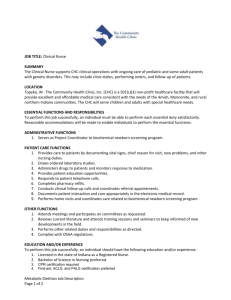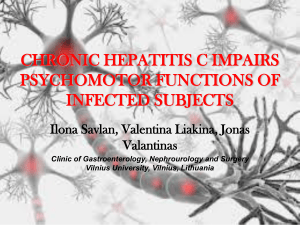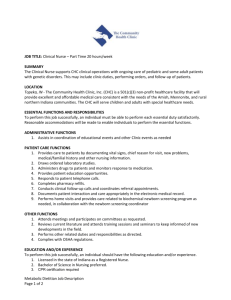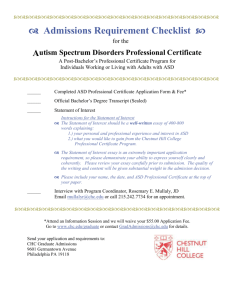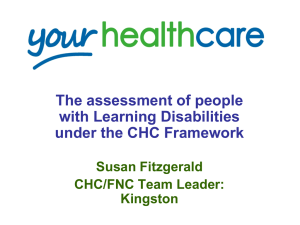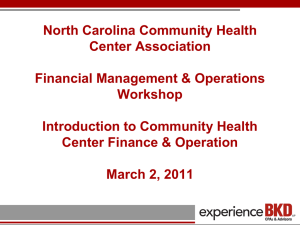NHS Heywood, Middleton and Rochdale Community Health Care
advertisement
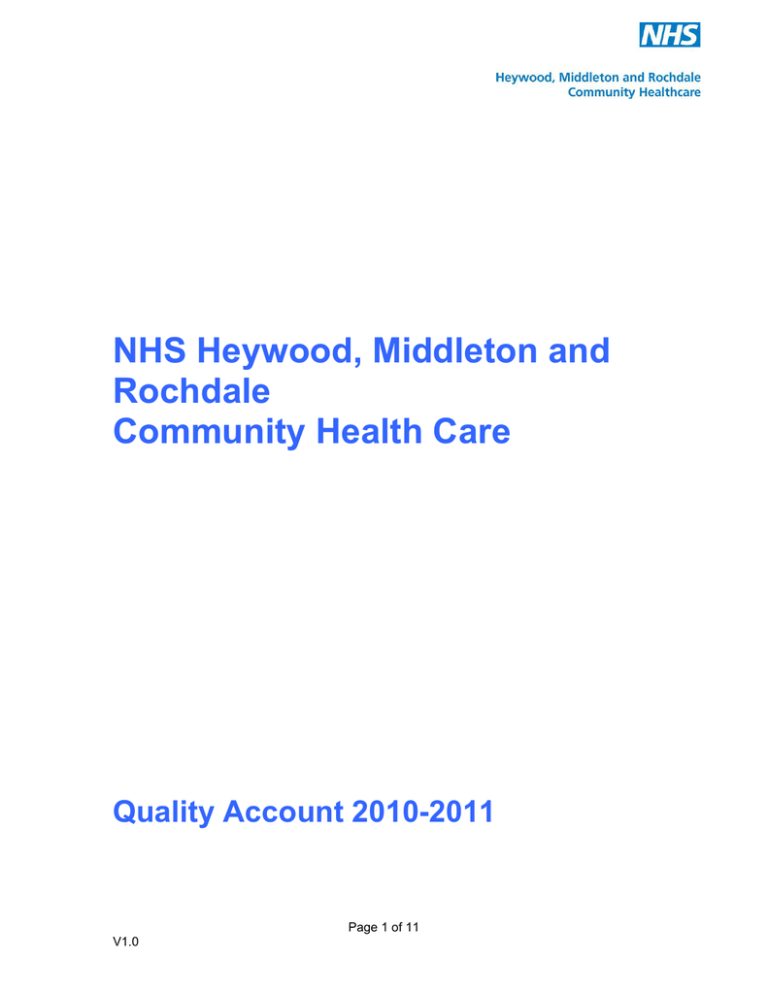
NHS Heywood, Middleton and Rochdale Community Health Care Quality Account 2010-2011 Page 1 of 11 V1.0 Contents Page Part 1 1.0 Statement from the Managing Director 3 2.0 Priorities for Improvement and Statements of Assurance from the Board 4 2.1 2.2 2.3 2.4 2.5 2.6 2.7 2.8 2.9 2.10 Priorities for Improvement Statements of Assurance from the Board Participation in Clinical Audits Participation in Clinical Research Use of the CQUIN Framework Statements from the Care Quality Commission (CQC) Data Quality NHS Number and General Medical Practice Code Validity Information Governance Toolkit Attainment Level Clinical Coding Error Rate 4 4 4 5 5 6 6 7 7 7 3.0 Review of Quality Performance in 2010-11 8 3.1 3.2 3.3 3.4 3.5 Patient Safety Incident Reporting to Support Patient Safety Records Audit Clinical Effectiveness Care Quality Commission Regulated Outcomes to Improve Clinical Effectiveness Mandatory Training Patient Experience Survey 8 8 8 9 9 4.0 Comments on the Quality Account 2010-11 11 4.1 Statement from NHS Heywood, Middleton & Rochdale (commissioner) regarding the HMR CHC Quality Account 2010-11 11 Part 2 Part 3 3.6 3.7 9 10 Part 4 Page 2 of 11 V1.0 Part 1 1.0 Statement from the Managing Director NHS Heywood, Middleton and Rochdale Community Healthcare (HMR CHC) provides community health care services for the population of the Rochdale borough. We made good progress in 2010-11 towards providing high quality care to the people of Heywood, Middleton and Rochdale, thanks to the continued hard work and enthusiasm from our workforce. Quality is fundamental to everything we do and we have strived hard to achieve quality improvements in patient safety, patient experience and clinical effectiveness through a range of initiatives. We have also developed and implemented a robust governance infrastructure to give us the level of scrutiny required to make continuous year on year improvements. We are pleased to report that we successfully registered with the Care Quality Commission (CQC) during 2010-11 and have implemented robust systems to ensure ongoing compliance with the CQC’s full range of essential quality standards that are fundamental to the registration system and to the services that we deliver. From 1st April 2011, HMR CHC transferred from the local PCT to Pennine Care Foundation Trust. During the transition, clinical and non clinical staff encountered and overcame significant challenges brought about by new ways of working within new organizational structures. Despite these difficulties, staff have continued to deliver high quality services throughout the year. This is the first Quality Account for HMR CHC and it aims to offer assurance to the public on our approach to a continuous programme of quality improvement to ensure positive health outcomes for patients. To the best of my knowledge, the information in this document is accurate. Signed: John Boyington Managing Director 29 June 2011 Page 3 of 11 V1.0 Part 2 2.0 Priorities for Improvement and Statements of Assurance from the Board 2.1 Priorities for Improvement NHS Heywood, Middleton and Rochdale Community Health Care (HMR CHC) transferred to Pennine Care Foundation Trust (PCFT) on 1st April 2011. As such, priorities for 2011-12 are included in the PCFT Quality Account. The priorities for 2011-12 that relate to community services are: • Engagement and participation in the Safety Express programme to reduce harm • An increase in the reporting of incidents • An increase in the take-up of child safeguarding training Further detail about each priority can be found in the PCFT Quality Account. 2.2 Statements of Assurance from the Board During 2010-11, HMR CHC provided one NHS service. HMR CHC has reviewed all the data available to it on the quality of care in this NHS service. The income generated by the NHS services reviewed in 2010-11 represents 100 per cent of the total income generated from the provision of NHS services by HMR CHC for 2010-11. 2.3 Participation in Clinical Audits During 2010-11, there were 18 national clinical audits and no national confidential enquiries that covered NHS services that HMR CHC provides. During that period HMR CHC participated in two national clinical audits which it was eligible to participate in. The national clinical audits and national confidential enquiries that HMR CHC was eligible to participate in during 2010-11 are as follows: • • • • Anxiety and depression national audit Cancer standards gold framework National falls and bone health audit Continence audit HMR CHC undertook a programme of local clinical audit and evaluations which were reported to the Clinical Audit and Scrutiny Group and the Provider Page 4 of 11 V1.0 Governance Group. Reports of local clinical audits that were reviewed by HMR CHC in 2010-11 included, for example: • • • • • • Adult musculoskeletal physiotherapy service patient outcome measures evaluation UNICEF Baby Friendly Breastfeeding audit (of Standard 1 – first re-audit) Baseline audit of Active Case Management medication reviews Hand hygiene Pressure ulcer incidents Indwelling devices Actions identified by clinical audits to improve the quality of healthcare were taken forward by and monitored by HMR CHC. Further detail of the clinical audit programme and outcome monitoring are available from PCFT, as the recipient of HMR CHC from 1st April 2011. 2.4 Participation in Clinical Research The number of patients receiving NHS services provided or subcontracted by the HMR CHC in 2010-11 that were recruited during that period to participate in research approved by a research ethics committee was 6 for portfolio studies and at least a further 40 patients recruited to other studies (non-portfolio). Participation in clinical research demonstrates HMR CHC’s commitment to improving quality of the care offered and to making HMR CHC’s contribution to wider health improvement. Clinical staff stay abreast of the latest possible treatment possibilities and active participation in research leads to successful patient outcomes During 2010-11 there were a total of 68 active research studies being undertaken in NHS HMR and involving HMR CHC clinical staff, that had been approved by a research ethics committee. Three of these studies were completed during the year. Research studies covered a range of clinical specialties including management of long term conditions, end of life care, psychology, non medical prescribing, dentistry, smoking cessation, community children’s nursing, and physiotherapy. 2.5 Use of the CQUIN Framework A proportion of HMR CHC income in 2010-11 was conditional on achieving quality improvement and innovation goals agreed between HMR CHC and any person or body they entered into a contract, agreement or arrangement with for the provision of NHS services, through the Commissioning for Quality and Innovation (CQUIN) payment framework. Achievement of these quality improvement and innovation goals attracts financial awards of up to 1.5% of the total contractual value. This was the first year CQUIN had been applied to community services. The agreed schemes for 2010-11 were: Page 5 of 11 V1.0 • • • • To improve data collection and quality of patient information in order to optimise service delivery (regional scheme) To enhance clinical supervision in clinical practice in order to maximise patient safety (local scheme) To provide baseline information on the experience of patients using services that will enable the identification of areas for improvement (local scheme) To improve baseline information on the quality of records in HMR CHC services (local scheme) All of the agreed goals for 2010-11 were fully achieved. Further details are available electronically at http://www.institute.nhs.uk/ Information about agreed CQUIN schemes for 2011-12 is available from PCFT. 2.6 Statements from the Care Quality Commission (CQC) HMR CHC was required to register with the CQC and its registration status in 2010-11 was, “registered”. HMR CHC had no conditions on its registration. Though HMR CHC declared only partial compliance with Regulation 23, Supporting Workers and Regulation 20, Corporate Records, the Care Quality Commission (CQC) accepted the registration with no conditions. As a consequence of partial compliance, action plans were submitted to NHS North West to ensure that HMR CHC would work towards full compliance in all areas. During 2010-11 HMR CHC has delivered against this action plan and now has a robust process and pathway for managing corporate records in order to be fully compliant with Regulation 20. To declare compliance with Supporting Workers (Regulation 23) HMR CHC has developed a clinical supervision framework which enables all clinical and therapy staff who have face to face contact to access supervision. The CQC has not taken enforcement action against HMR CHC during 2010-11. HMR CHC has not participated in any special reviews or investigations by the CQC during the reporting period. 2.7 Data Quality PCFT as the recipient of HMR CHC from 1st April 2011 will be identifying and taking action during 2011-12 to improve community provider data quality. HMR CHC in 2010-11 has seen an increase in iPM usage from a baseline of 20% in 2008/09 where most people just turned the machine on, to 100% compliance recorded in most services. Page 6 of 11 V1.0 2.8 NHS Number and General Medical Practice Code Validity HMR CHC did not submit records during 2010-11 to the Secondary Uses Service for inclusion in the Hospital Episode Statistics as NHS HMR does not provide these services. 2.9 Information Governance Toolkit Attainment Level HMR CHC information governance assessment overall score for 2010-11 was 63% and was graded as red. This percentage score represented both the commissioning and provider arm of the PCT. 2.10 Clinical Coding Error Rate HMR CHC was not subject to the Payment by Results clinical coding audit by the Audit Commission during 2010-11. Page 7 of 11 V1.0 Part 3 3.0 Review of Quality Performance in 2010-11 HMR CHC has continued to make good progress in 2010-11 towards providing high quality care to the people of Heywood, Middleton and Rochdale. The following provides a brief summary of some of the excellent work that has been undertaken during 2010-11 3.1 Patient Safety Patient Safety is paramount and in 2010 we signed up to the Patient Safety Campaign. The aim of the campaign is to make the safety of patients everyone’s highest priority, thereby supporting the vision “no avoidable death” and “no avoidable harm”. For HMR CHC as an organisation this means continuing to carry out risk assessments; the identification and management of patient related risks; the reporting and analysis of incidents; and the capacity to learn from and follow-up on incidents and implement solutions to minimise the risk of them recurring. Of particular note are the improvements with the prevention, identification and management of pressure ulcers. In 2011-12 work to improve patient safety is being developed further through the ‘Safety Express’ programme which is a national initiative to reduce patient harm. 3.2 Incident Reporting to Support Patient Safety HMR CHC now uses an on-line system for reporting and this has resulted in an increase in both the number of incidents and the quality of the information. It is difficult to identify therefore, whether the increase in incidents is actual, or as a result of the introduction of the new system. All incidents and action plans to support lessons learnt have been discussed at the Clinical Audit & Scrutiny Group. This group was tasked with providing assurance to the Provider Board that lessons learnt were being addressed. In order to develop and build upon the process for sharing information of lessons learnt across all services, a process of reporting incidents to each service on a monthly basis has been developed. This will be further developed following the move of HMR CHC into PCFT. 3.3 Records Audit To further support patient safety in 2010-11 all our clinical services engaged with the monthly records audit. This audit was carried out to improve and standardise baseline information on the quality of records across HMR CHC services. Five records were randomly selected from each service per month for audit to cover 50% of services. 63% of HMR CHC services have completed the audit and Page 8 of 11 V1.0 produced internal action plans which are audited against and monitored through the Clinical Audit and Scrutiny Group. 3.4 Clinical Effectiveness HMR CHC is committed to providing a clinical non-management supervision programme, which enhances the clinical support and professional development for all healthcare staff who engage in face to face patient/client activity. Clinical Supervision is recognised as a key element to supporting Clinical Governance that enables practitioners to examine their practice, their skills, knowledge, attitudes and values in a safe structured environment. Effective participation in clinical supervision is seen as individuals demonstrating their accountability and taking responsibility for the continuous improvement of their practice, contributing to more effective clinical risk management and improvements in patient care (Butterworth and Woods 1998). In 2010-11 HMR CHC launched the principles of clinical supervision supported by a framework and clinical supervision training delivered by a local university. During 2010-11 HMR CHC also embarked on the Productive Community Services programme, which provides a systematic approach to reviewing ways in which services operate in order to optimise time clinical staff spend with patients and service users, so improving clinical effectiveness and patient experience. 3.5 Care Quality Commission Regulated Outcomes to Improve Clinical Effectiveness Following registration with CQC an internal CQC Task and Finish Group was established to ensure that services were informed of their responsibility in relation to delivering against the outcomes for CQC. This resulted in the launch of a CQC governance tool which services were asked to complete by self assessing themselves against the patient focused outcomes. On completion of their assessment, with the use of a judgement framework ratified by external auditors, the project team reviewed service evidence and provided guidance as to where some patient evidence outcomes could be improved. Following the internal CQC visits, services produced an action plan, identifying potential areas of improvement which were monitored through the Clinical Audit and Scrutiny Group. 3.6 Mandatory Training HMR CHC targeted mandatory training to improve attendance and compliance to support and enhanced clinical effectiveness. Baseline data (Nov 2010) on infection control training was reported as 26.49% improving to 69.92% in March 2011. Page 9 of 11 V1.0 3.7 Patient Experience Survey During 2010-11 all 34 services engaged with a comprehensive patient experience survey. This generic survey aimed to capture patients’ experiences in relation to care received, involvement in decision making, being treated with dignity and privacy and confidentiality. Overall the results of the survey identified that patients/clients believed that their experience of HMR CHC was very good/good. All services completed action plans to address any areas of improvement which were monitored through the Clinical Audit and Scrutiny Group. Page 10 of 11 V1.0 Part 4 4.0 Comments on the Quality Account 2010-11 The Quality Account was shared with members of the Overview and Scrutiny Committee and the Local Involvement Network (LINKs) prior to publication to offer the opportunity to comment. 4.1 Statement from NHS Heywood, Middleton & Rochdale (commissioner) regarding the HMR CHC Quality Account 2010-11 Whilst HMR CHC was part of NHS HMR during 2010-11, it operated as a separate organisation within NHS HMR, with its own governance structures, Provider Board and reporting arrangements to NHS HMR as a service provider to a service commissioner. As such NHS HMR has reviewed the HMR CHC Quality Account 2010/11 as it would review such accounts from other service providers. The review has compared the accuracy of the qualitative information and data contained in the Quality Account with the qualitative information and data provided by HMR CHC, as part of its contractual requirements during the year. The presentation and scrutiny of this information and data in year has been facilitated through the Integrated Governance Committee (subsequently the Quality Committee) which in turn reports to the PCT Board. HMR CHC has worked with the commissioners to devise and implement its quality programme which has provided a firm foundation on which to progress the quality agenda. This has helped to embed a culture of ongoing quality monitoring in readiness for the introduction of the new contractual monitoring arrangements as HMR CHC becomes part of PCFT from April 2011. The commissioners look forward to developing further comprehensive measures of quality and safety for community services in 2011-12. Having considered the contents of this Quality Account, NHS Heywood, Middleton and Rochdale confirms that it considers that this Quality Account contains accurate information in relation to the services provided to it by HMR CHC during 2010-11. Page 11 of 11 V1.0
